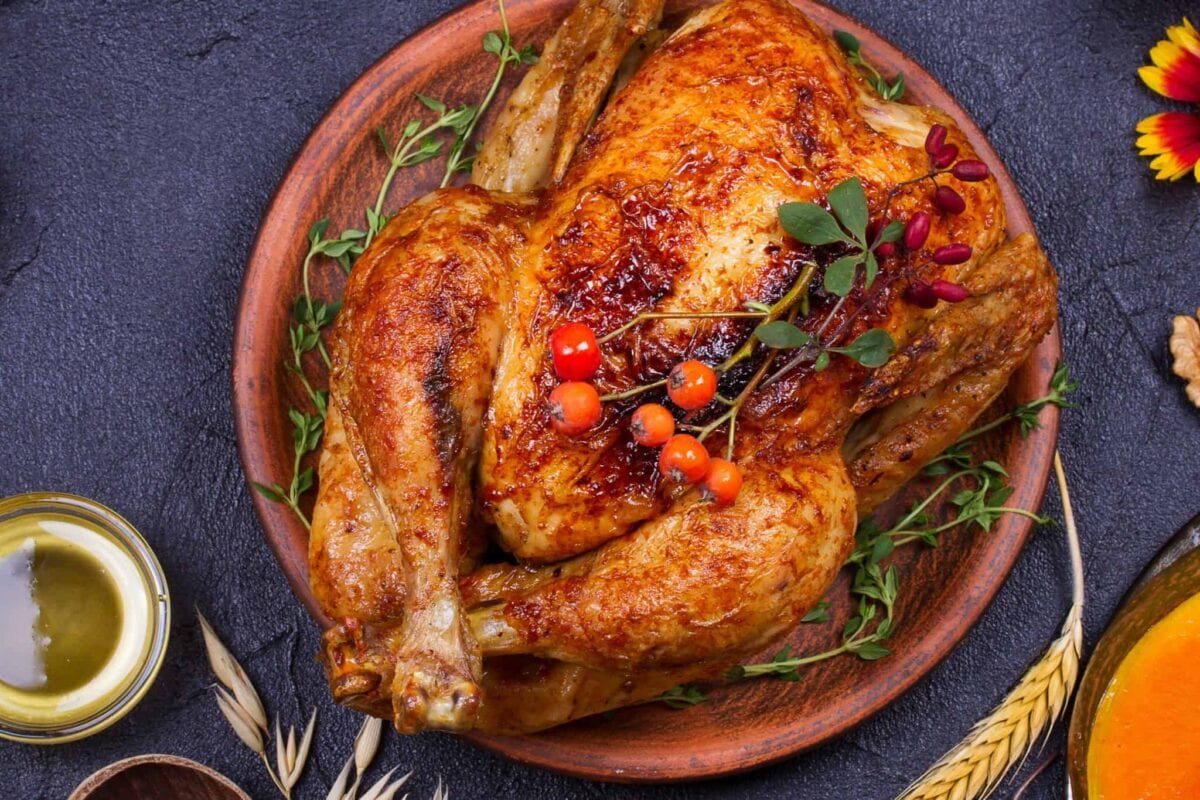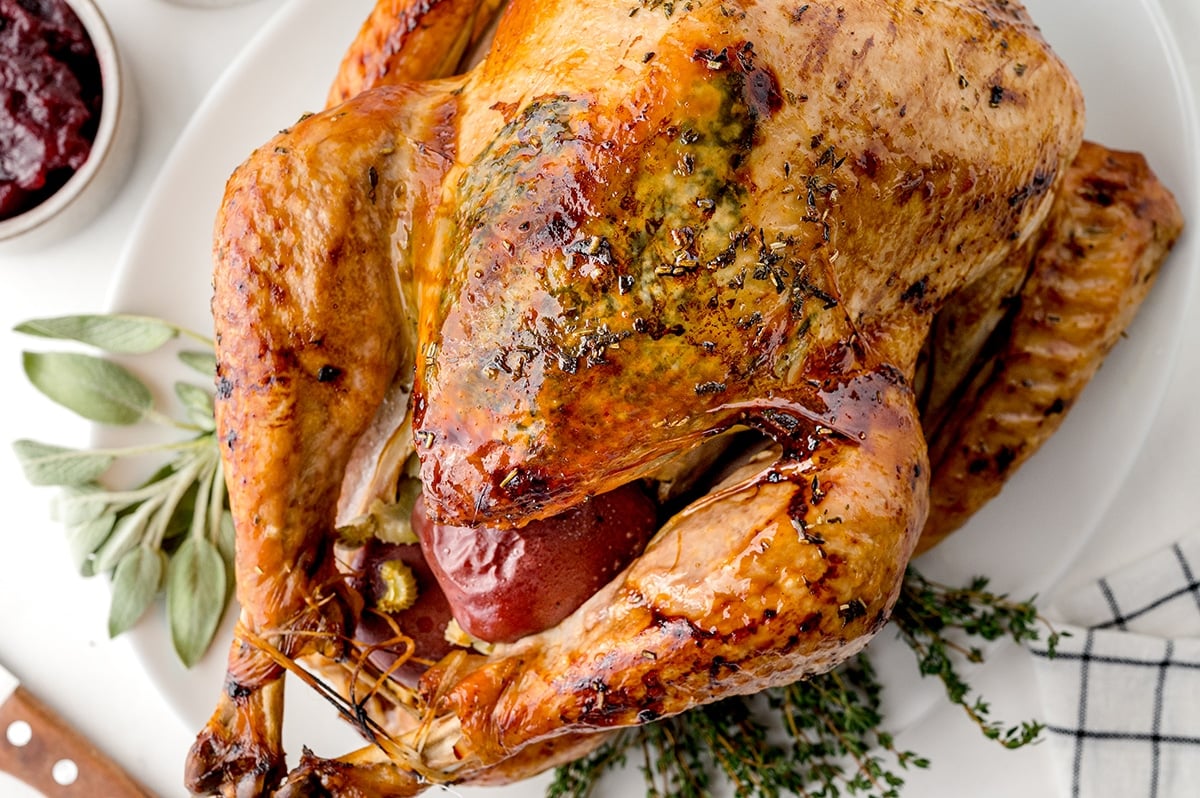Thanksgiving turkey recipes have sure come a long way. Thanksgiving dinner, in general, has come a long way!
Simple brine for turkey can be as easy as dissolving salt in water or as complicated as a two-day process of an herb infused brine and then allowing for an air dry for the perfect, crispy turkey skin.
Is it worth it to brine a turkey? I think so! Many others would agree with me. While there lots of ways to keep your turkey moist and succulent, brining is probably the best way. It adds flavor from the skin to the bone- no rub or injection offers that.
Brining a turkey before roasting is a time-honored technique that helps ensure a moist flavorful bird with crispy skin. The salt in the brine seasons the meat while also helping it retain moisture. But it is possible to over-brine a turkey if left soaking for too long. Here’s what you need to know about brining times to avoid ruining your holiday bird.
What is Brining and Why Do it?
Brining involves soaking meat or poultry in a saltwater solution before cooking. The salt allows the protein fibers to absorb and retain more moisture, resulting in a juicier finished product. The salt also seasons the meat throughout.
Brining is especially helpful for lean meats like turkey breast, which can easily dry out during roasting. The extra moisture helps prevent the meat from drying out and becoming tough.
Brining for the right amount of time imparts flavor and moisture while avoiding a overly salty taste. Get the timing wrong, and you could end up with an inedible turkey.
How Long Should You Brine a Turkey?
Most experts recommend brining a whole turkey for 12-24 hours. This gives enough time for the salt and flavorings to permeate the meat, without making it unpalatably salty.
Here are general guidelines for turkey brining times
- 8-12 pounds: 12-18 hours
- 12-16 pounds: 18-24 hours
- 16-20 pounds: 24 hours
- 20+ pounds: 24-36 hours
Keep in mind that these are just guidelines. If brining for the full 24 hours, use a less concentrated brine to avoid over-salting. Never brine frozen turkey – only brine thawed or fresh birds.
Signs of Over-Brining
If you accidentally leave the turkey soaking too long, here are some signs that it has become over-brined:
- Very salty taste throughout the meat
- Extremely soft, spongy, or mushy texture
- Waterlogged appearance with juices pooling on the surface
- Skin separates from the flesh and won’t crisp up
The meat may also have a very ham-like texture if brined more than 2 days. This happens because the salt causes the proteins to break down too much.
What to Do if You’ve Over-Brined
If you realize you’ve over-brined the turkey, don’t panic. You can still potentially save it:
-
Rinse the turkey under cold water to remove excess salt from the surface. Pat it very dry.
-
Soak in fresh, cold water for 1 hour to help draw some of the salt back out of the meat.
-
Pat dry again. Then let sit uncovered in the fridge for 24 hours. This helps form a pellicle for better browning.
-
Roast as you normally would, but skip any additional seasoning. Use low temps to promote browning without overcooking.
-
Serve with gravy made from broth or diluted pan juices rather than straight pan drippings, which will be very salty.
While the meat may still be a bit too salty, these steps can help mitigate the damage from over-brining.
Tips for Brining Turkey the Right Amount
To avoid over-brining your turkey, keep these tips in mind:
-
Use less salt for long brining times. Reduce to 1/4-1/2 cup salt per gallon if brining 12-24 hours.
-
Inject flavor instead. Injecting a salt and herb solution can season the meat without extended brining.
-
Brine and air-dry. Brining for just 4-6 hours followed air-drying in the fridge gives seasoning without over-brining risk.
-
Submerge fully. Make sure the brine fully covers the turkey at all times. Agitate the container occasionally to disperse salt.
-
Chill properly. Keep the brine chilled with ice water or ice packs. Never brine on the counter or in a warm garage.
-
Rinse after brining. Always rinse the turkey and pat it completely dry before roasting. This removes excess surface salt.
-
Set reminders. Set a phone timer so you don’t forget when to pull the turkey out of the brine. 24 hours goes by quickly!
Make Brine the Right Strength
To avoid over-salting, make sure your brine solution is the proper concentration:
For a 12-18 hour turkey brine, dissolve 1 cup kosher salt per 1 gallon of water. You can add sugar, spices, and flavorings as desired. This ensures full seasoning without too much saltiness.
For an 18-24 hour brine, reduce the salt to 3/4 cup per gallon. For a 24-36 hour brine, use just 1/2 cup salt per gallon.
Always thoroughly dissolve the salt before adding the turkey. Agitate the container occasionally to evenly distribute the salt. Keep chilled at 40°F or below with ice water or frozen ice packs.
Master the Art of Proper Brining
It’s easy to get brining time wrong, but don’t let that stop you from reaping the rewards of a perfectly brined and roasted turkey. Follow these best practices for brining so your holiday bird is memorable for all the right reasons.

What is the best salt to water ratio for brine?
The typical ratio for brine is 1/4 cup of coarse kosher salt to every 4 cups of water. However, this doesn’t have to be exact. I also strongly recommend using only coarse kosher salt, which is less salty and has less sodium If using table salt, the volume needs to be reduced by at least half and could still be a little too salty. Make sure to rinse the bird with cold water after brining.

Turkey Brine vs. Rub vs. Injection
Is it just me, or did brining a turkey not become a “thing” until a few years ago? The newest in turkey trends. What will be next?
- Turkey Rub– Great for seasoning right on the skin of the turkey, no marinating time needed. Just rub and go.
- Turkey Injection– Can be used in conjunction with the rub, but not brining. You literally inject liquid into the turkey. No need to let it sit. Create pockets of flavor and moisture.
- Brine– Bringing is the creme de la creme of turkey preparation, but also requires a bit of thinking ahead. It plumps every fiber of turkey with moisture and flavor, but also takes a good deal of space and at least 24 hours.
After any of these preparations, you can roast, fry or smoke the bird.

Can you brine a turkey too long?
FAQ
What is the longest you can brine a turkey?
What happens if you brine a turkey longer than 24 hours?
Is it okay to brine a turkey for 36 hours?
Is it worth brining a turkey for 12 hours?
